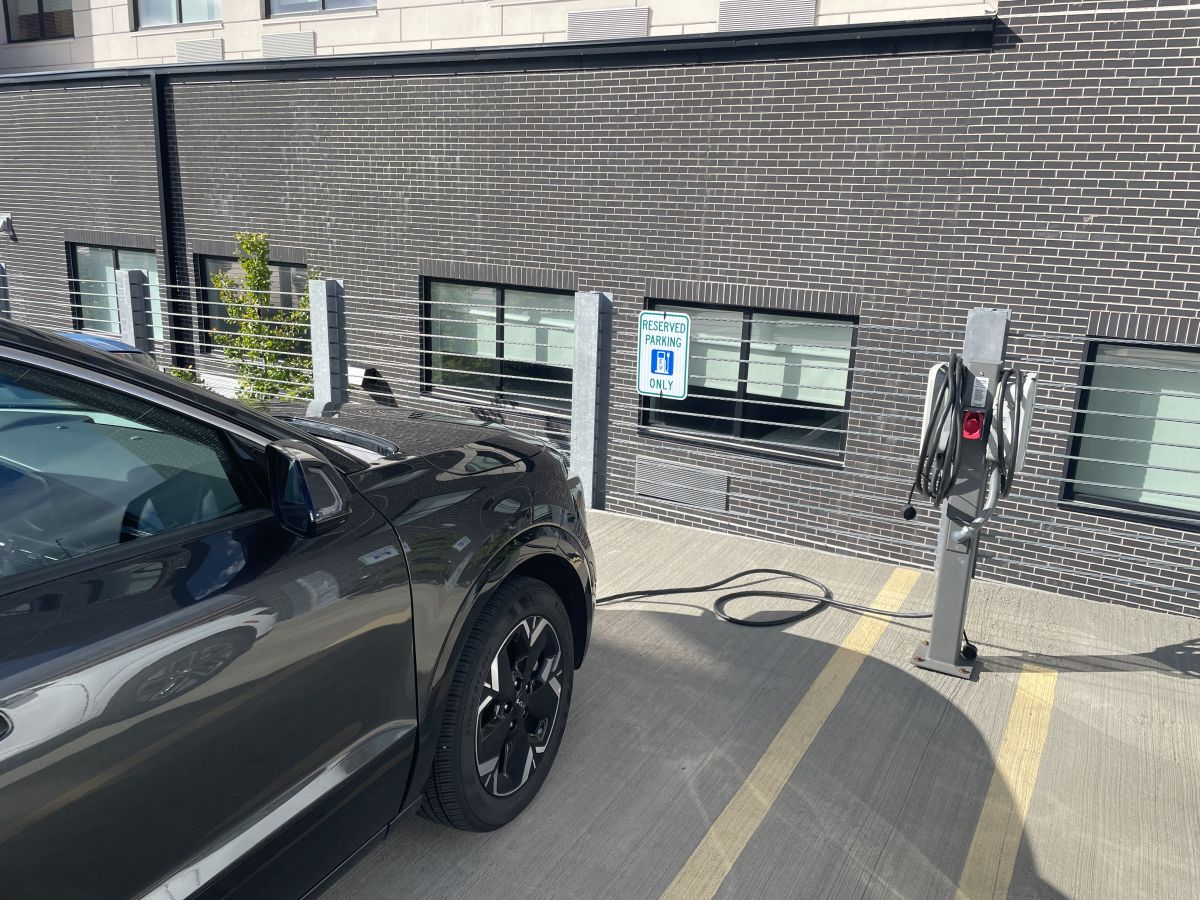Stand up for the facts!
Our only agenda is to publish the truth so you can be an informed participant in democracy.
We need your help.
I would like to contribute

PolitiFact hits the road from Exeter, N.H., to Nashua, N.H., in an electric vehicle on Oct. 14, 2023. (Samantha Putterman/PolitiFact)
MANCHESTER, N.H. — On the campaign trail, former President Donald Trump has criticized the shift to electric vehicles, an effort that has been encouraged by his potential 2024 opponent, President Joe Biden.
Trump told a Nov. 11 crowd in Claremont that electric vehicles "don’t go far," using their state of New Hampshire as an example.
"You can't get out of New Hampshire in an electric car," he said. "Where are you going? ‘I'm going to Massachusetts.’ Well, you better get yourself a gas turbine because this car is not going to get you there. Well, you could, if you stop about four times now."
New Hampshire doesn’t have the greatest public electric vehicle charging infrastructure. Depending on the estimate, the state has 220 to 350 publicly accessible EV chargers, or one for every 4,000 to 6,000 residents. That’s in the middle of the 50-state pack, and it’s far behind the No. 1 state, New Hampshire’s neighbor, Vermont, with about one for every 750 residents.
"Because the state hasn't invested in publicly available infrastructure, the bigger driving days can be a challenge," said Sam Evans-Brown, executive director of Clean Energy NH, a green energy advocacy group based in Concord. If you’re spending three hours or more in your car, he said, "you have to get pretty creative in stitching together a road trip."
PolitiFact reporters learned this firsthand after renting an electric vehicle in New Hampshire to fact-check a series of candidate events in October 2023.
However, Trump omits an important point: Many EV owners can surmount this challenge by charging their vehicle at home. Multiple EV owners in New Hampshire told us they do precisely that.
A car charger (that didn't work for us) in Manchester, N.H. (Louis Jacobson/PolitiFact)
Our experience in New Hampshire
Neither of us had ever driven an EV, or charged one. We chose this option because it was significantly cheaper than conventional options at Boston’s Logan Airport.
Our trip involved covering GOP presidential candidates in three cities, Manchester, Nashua and Exeter.
We knew our Airbnb had no home charging station, so we steeled ourselves for charging on the road. We used a free app, ChargeHub, that showed us the locations and availability of public charging stations.
Our black Kia Niro, a compact crossover SUV, had about 250 miles worth of charge when we picked it up. After driving about 100 miles from the airport, we knew we would have to charge on Day 2.
Our first attempt at public charging was clunky. We drove to a downtown Manchester hotel that the app said had a public charger, but the charger wasn’t working. So, we drove to a nearby public garage, connected the plug and headed across the street for coffee and some writing.
About 90 minutes later, we returned to the car … which had only 15 to 20 miles of additional charge. It had to do; we needed to drive to a forum in Nashua to see GOP presidential candidates.
We began Day 3 by returning to the same charger in the Manchester public garage. We figured we’d have another round of coffee and writing, then drive to a town hall with presidential candidate Vivek Ramaswamy in Exeter. The app told us that one inn in Exeter had a charger, but once we got there, the front desk said it was only for patrons. So, we went to a second inn; the staff took pity on us and said we could charge while we were at the event, for a $15 access fee.
By the time we unplugged and left the inn, we had about 75 miles of charge left. Google Maps told us that the Nashua hotel hosting the candidate forum’s second day was faster to reach by interstate, but the distance would be shorter if we took a country route.
So, with little margin for error, we went the nearly 60 miles by country roads.
As we arrived in Nashua, we found a charger within walking distance of the hotel where candidates Tim Scott and Mike Pence were to speak. (Both have since exited the race.) After the event, we let the car charge and walked 20 minutes along busy roads for lunch and more coffee. (The car needed juice, and so did we.)
After about five hours of charging, we had enough power to go back to Manchester that night, plus enough for the next morning’s return to Logan, though we were so strapped for charging time that we had to pay a penalty for low charge when we arrived at Logan.
Bottom line: We reached all our events in time, but doing so required careful geographic choreography, and the process was sometimes nerve-racking.
The authors getting some writing done while the EV was charging, at our home away from home, Manchester's Hometown Coffee.
What New Hampshire residents can expect
Most New Hampshire EV owners could have an easier experience. Although longer road trips often require more logistics, everyday driving does not.
Installing a home charging station takes the worry out of finding public chargers. According to Motor Trend, it costs "around $1,150 to $2,750 to purchase and install a 240-volt charging station" for a home, including the hardware and installation. That’s a fraction of the cost of an EV, which starts at $26,000, according to Edmunds.
Bill Dillon, of Portsmouth, said he drives about 260 miles a week and can get by with one charge a week, available free at his workplace. His apartment building also has charging stations.
"After a few weeks it became evident that driving an electric vehicle has so many advantages over a gas engine — extra room, great pickup, no oil changes or engine repair, and very fun to drive," Dillon said. "I have no regrets about my purchase."
The charging architecture for Dillon’s Kia EV6 also allows it to "fast charge," which further simplifies even longer trips. "It can go from 20% to 80% in as little as 18 minutes," he said.
Cars that can accept fast charging, and the chargers that enable it, are proliferating. For several quarters running, the number of fast chargers has grown most rapidly of any kind of charger, according to the U.S. Energy Department. And Walmart has deployed 1,300 fast chargers at more than 280 facilities, with plans to expand further. About 90% of Americans live within a 10-mile radius of a Walmart.
Seth Fiermonti of Durham said he’s driven his Tesla as far away as Bar Harbor, Maine (235 miles), Hartford, Connecticut, (160 miles) and Albany, New York, (200 miles) before needing to recharge.
"I don’t think I’ll ever go back to a gas car," Fiermonti said. "Any EV I’ve been in is smooth, quiet, efficient and easy to maintain."
Some EV owners said they need to pick their spots. Jessyca Keeler, president of the group Ski New Hampshire, said she most often uses home charging for 2022 Hyundai Ioniq5, to power and preheat her car before leaving home in New Hampshire’s cold winters.
However, if she travels beyond her home region, perhaps to visit her association’s far-flung ski resort members, Keeler said she needs "to take the time to plot where I can charge the car, since you can’t just find chargers everywhere like you can gas stations."
For remote destinations, Keeler said she sometimes uses her gasoline-powered vehicle.
Our Sources
Donald Trump, remarks at a rally in Claremont, N.H., Nov. 11, 2023
Motortrend.com, "Everything You Need to Know About Charging an EV at Home," March 9, 2023
Edmunds.com, "Cheapest Electric Vehicles & Plug-in Hybrids," July 25, 2023
EVBox, "The current state of the DC fast-charging market," July 14, 2023
U.S. Transportation Department, "Charger Types and Speeds," accessed Nov. 15, 2023
U.S. Energy Department, "Electric Vehicle Charging Station Locations," accessed Nov. 27, 2023
U.S. Energy Department, "Electric Vehicle Charging Infrastructure Trends," accessed Nov. 27, 2023
National Renewable Energy Laboratory, "Electric Vehicle Charging Infrastructure Trends from the Alternative Fueling Station Locator: Second Quarter 2023," October 2023
Governing.com, "New Data Shows States With Highest and Lowest Number of EV Charging Stations," Nov. 30, 2022
Kia, Niro homepage, accessed Nov. 15, 2023
PolitiFact, "New electric vehicle tax credit rules aim to reduce dependence on China, but present new obstacles," May 1, 2023
PolitiFact, "Donald Trump’s off-base claims about electric car ‘mandates’ and markets," Oct. 11, 2023
Email interview with Bill Dillon of Portsmouth, New Hampshire, Nov. 14, 2023
Email interview with Seth Fiermonti of Durham, New Hampshire, Nov. 14, 2023
Email interview with Jessyca Keeler of Center Conway, New Hampshire, Nov. 15, 2023
Email interview with Sam Evans-Brown, executive director of Clean Energy NH, Nov. 14, 2023











































